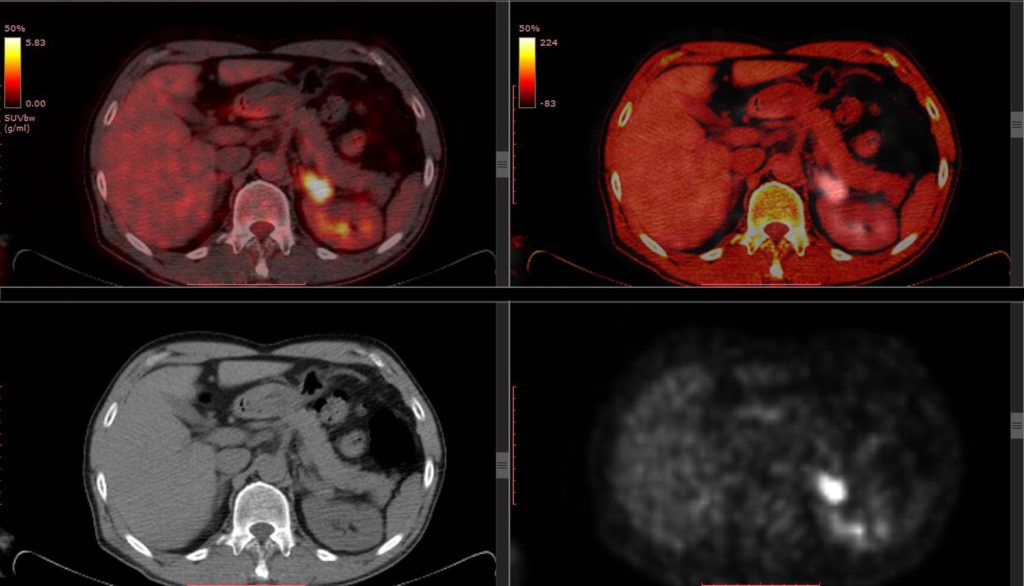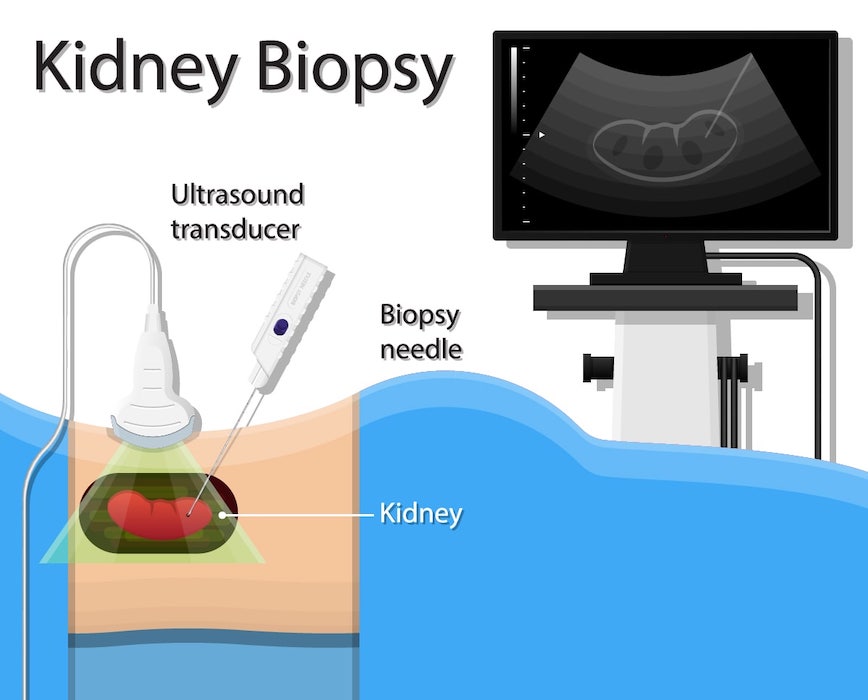Our body has two kidneys, each on one side of the body along the flanks of the upper abdomen. Our kidneys are bean-sized structures that lie near our backs, on each side of the spine. Kidneys are vital organs that are essential for survival. Apart from assisting with processing and eliminating waste products and extra fluid from the body as urine, they also help with regulating a healthy balance of water, salts, and minerals in the blood.
Kidney cancer, also referred to as renal cancer, is a condition that arises when the kidney cells become malignant (cancerous). These cells grow out of control and multiply rapidly, leading to the growth of a lump of tissue in the kidney, known as a tumour. A tumour is malignant when it has the potential to invade nearby tissues and spread to distant organs. The most common type of kidney cancer (90%) is known as renal cell carcinoma (RCC), and it often appears first in the lining of tiny tubes located within the kidney, also known as tubules. Renal transitional cell carcinoma (TCC) or urothelial cancer (UC) is another kind of kidney cancer that arises from the inner lining of the urinary tract. This cancer does not occur commonly and accounts for around 5-10% of kidney cancers.

The majority of people with kidney cancer in their early stages do not have any symptoms. About two-thirds of kidney cancers are found when patients visit the doctor for issues unrelated to kidney cancer. These incidental findings are usually seen on radiological imaging when the cancer is still in its early stages. However, for the remaining one-third of patients, the cancer is usually more advanced.
In general, kidney cancer symptoms include:
When renal cancer spreads to other parts of the body, it may cause a number of symptoms, such as:

There are four stages of kidney cancer – Stage I, II, III, and IV. The lower the number, the less the cancer has spread. Stage 4 kidney cancer denotes metastatic cancer; this means the kidney cancer has spread to other organs as well, such as the lungs, pancreas, bowel, and bone. Once kidney cancer has been diagnosed, the doctor will proceed to determine the staging. Staging of cancers is important because it helps to ascertain whether the kidney cancer has spread or not and to determine the extent of the spread. This will also determine the prognosis of the patient and their kidney cancer treatment plan. Cancer staging is one of the main factors that are taken into account while discussing survival statistics.
Most kidney cancers do not have a specific cause to them, although certain risk factors can increase your risk of getting kidney cancer, such as:
If an individual shows kidney cancer symptoms that may point towards the condition, their primary care doctor will refer them to a urologist for further assessment and evaluation.
But before you make it to your consultation, it is advisable to prepare yourself and make a list of all your symptoms and concerns. Having a list of all your current medical conditions and medication will help the urologist get a good understanding of your current health status and medical history.
During the consultation, the doctor will typically begin by taking a detailed medical history, including your current symptoms, past medical history, medication list, social history (such as whether or not you smoke, drink alcohol, and your occupational history), and family history. This history-taking is essential in gauging your condition as well as in identifying any risk factors that may predispose you to renal cancer. This will then be followed by a physical examination to help the specialist gain more vital information about your condition as well as to check for any abnormal changes in your lungs, heart, and abdomen.
If kidney cancer is suspected following the findings of your history-taking and physical examination, your doctor may order more tests to help confirm the diagnosis. These tests may include some of the following:


No, there is no specific blood test to diagnose kidney cancer. However, a few blood tests may be taken at the clinic to assess your kidney function. This is important as renal cancer has the potential to damage kidney cells which could result in an impairment in kidney function.
Surgery for kidney cancer can either be done in the more traditional, open surgery method, which involves large incisions on the abdomen, or through small incisions in the skin in a minimally invasive surgery (MIS) method.
MIS can be done laparoscopically, also conventionally known as key-hole surgeries, or through robot-assisted techniques, which offer 3D visualisation and enhanced control during surgery. The choice between MIS or open surgery depends on the characteristics of the tumour and the patient’s individual factors and fitness for surgery.
Radical nephrectomy involves the removal of the kidney, adrenal gland, and surrounding tissues. It is generally done for large stage 2 or stage 3 kidney cancers.
Partial nephrectomy involves removing the cancer within the kidney as well as some tissue around it. In this surgery, only a part of the kidney is removed. Partial nephrectomy is indicated for patients with smaller tumours that are <4 cm, for selected tumours <7 cm, or in patients in which a total nephrectomy (removal of the whole kidney) should not be done unnecessarily in view of poor renal function in the other kidney. The main benefit of this approach is that the kidney can be spared as a large portion of it is not removed.
A nephroureterectomy involves the removal of the kidney as well as the ureters, which are the tubes attached to the kidneys that bring urine down to the bladder and a small cuff of the bladder. This surgery is typically performed for urothelial cancers.
Systemic treatment with targeted therapy (drugs that target specific cells in the body) or immunotherapy (drugs that utilise the body’s immune response to kill off cancer cells) may be used to treat advanced kidney cancer. This may also be used in conjunction with surgery to help improve survival outcomes. Systemic therapy is also an alternative for patients who are not fit for surgery.
Local ablation is a minimally invasive procedure that utilises some form of energy to destroy cancer cells. This may include radiofrequency ablation, microwave ablation or cryoablation. The short-term and intermediate outcomes for selected small tumours are generally good.
In general, early kidney cancer treatment leads to positive outcomes. Therefore, it is important to seek medical help early, especially if you are at risk of kidney cancer or have suspicious symptoms such as haematuria (blood in urine) and loss of weight and appetite. Most localised kidney cancers are treatable and can be cured.
It is reassuring to note that there are still many effective kidney cancer treatment modalities for patients with more advanced cancers, such as immunotherapy, and it is advisable to consult a doctor if you suspect that you may have a few kidney cancer symptoms. Following treatment, most patients can live a normal life without the need for dialysis, along with good remission rates.
In their early stages, patients with kidney cancer are usually asymptomatic (no symptoms or signs), resulting in most being diagnosed in their advanced stages or during an incidental finding when they undergo evaluation for another medical concern. However, some signs and symptoms may be seen as the tumour develops.
Here are some of the kidney cancer symptoms that may hint toward a diagnosis of this condition:
Most patients with kidney cancer can be treated effectively with surgery if they present in their early stages. Therefore, it is important to seek medical attention from a urologist if you notice any signs or symptoms that may hint towards a kidney cancer diagnosis, such as haematuria, loss of appetite, unintentional weight loss or anaemia.
While surgery is the primary kidney cancer treatment in most cases, some may need a combination of other treatment modalities, including targeted therapy and immunotherapy. Surgery entails removing the entire tumour, which may be done through the conventional open surgery technique or laparoscopic surgery. Furthermore, some may even be offered the option of undergoing robotic surgery if deemed suitable. Relative to open surgeries, robotic urologic surgery provides multiple benefits such as less postoperative pain, a speedier recovery and less noticeable scars.
Kidney cancer in Singapore accounts for 1-2% of all cancers and is one of the 10th most common cancers in men. Globally, according to the American Kidney Cancer Society, the 5-year survival rate for localised kidney cancer is around 93%, with a 72% rate for regional cancers and a 15% rate for distant kidney cancers. Kidney cancer is more prevalent in men than women and is commonly found in elderly patients, where approximately two-thirds of those diagnosed are above age 65. With the rise of the use of imaging techniques, such as ultrasound scans (USS) and computed tomography scans (CT), the prevalence of this condition has shown to increase at a rate of around 2-3% each year.
Yes. If malignant kidney cancer is not treated or the condition goes undetected, it has the potential to be life-threatening. While some can be aggressive and spread to other organs, a good prognosis can be expected if prompt kidney cancer treatment is provided in the early stages.
The most common kidney cancer in Singapore is renal cell carcinoma (RCC), and it accounts for about 85-90% of all diagnosed cases worldwide. Benign (non-cancerous) kidney tumours, on the other hand, aren’t usually fatal as they do not spread to other parts of the body. These tumours may be removed surgically, if they are causing symptoms, such as bleeding or are causing issues to the normal function of the kidney.
The rate at which kidney cancer spreads will depend on a number of factors, including the type, size, extent, and grade of the cancer. Usually, larger and higher-grade tumours tend to be more aggressive and are more likely to metastasise (spread) to other organs, while low-grade tumours are more slow-growing.
According to the World Journal of Oncology, the most common and aggressive form of renal cell carcinoma is the clear cell subtype, and about 70% of kidney cancers are composed of these cells. Renal oncocytoma (a noncancerous kidney tumour), on the other hand, is not aggressive, grows rather slowly and does not metastasise .
Overall, the rate of spread will vary depending on the type of kidney cancer, making medical evaluation an important facet for an enhanced outcome. Therefore, it is essential that you consult a reliable and experienced medical professional for a thorough assessment like Dr Terence Lim, who is a Senior Urology Consultant as well as the Medical Director at Assure Urology & Robotic Centre. With a subspeciality in Uro-Oncology (urological cancers) and experience in doing over 700 robotic surgeries, he is well versed in providing expert treatment for kidney cancer.
At Assure Urology & Robotic Centre, we understand that coming to terms with a diagnosis of kidney cancer and coping with the effects of the condition can be very stressful and challenging. But you do not have to lose all hope. As mentioned previously, we have a number of treatment modalities that can make your recovery journey easier.
Our Senior Urologist, Dr Terence Lim, also performs several procedures, including reconstructive surgery and trauma, kidney stone removal, circumcision, and robotic urologic surgery. Dr Lim is well-experienced in urological care and has performed over 700 robotic surgeries in his tenure.
Whether you are suffering from a debilitating condition like cancer or need guidance with illnesses such as benign prostatic hyperplasia (BPH), urinary tract infection (UTI), kidney stones, or urinary incontinence, do not hesitate to reach out to us.
Kidney cancer, while the cause is not often known, can present insidiously, and it is important to detect any warning signs that might be present. Making sure you understand the risk factors of kidney cancers is important so that you can do your best to ensure good health and have good outcomes while controlling your medical conditions effectively.

MBBS, MRCSed, MMED(Surgery)
Dr Terence Lim is a Senior Consultant Urologist with a subspecialty in Uro-Oncology. He is also the Medical Director at Assure Urology & Robotic Centre. His clinical interests include Uro-Oncology, Minimally-invasive Urological Surgery, Urinary Stone Disease, Endourology and Prostate Health.
Prior to his private practice, Dr Terence Lim spent almost two decades in public healthcare. He served as the Senior Consultant and Chief of the Department of Urology at Changi General Hospital (CGH). In addition, he is currently a Visiting Consultant at CGH. Dr Lim was also the director of CGH’s Advanced Surgical Centre, a committee dealing with complex surgeries, including robotic surgeries.
Your health is important to us and some conditions require immediate attention. For emergencies, please contact us at 9835 0668.

MBBS, MRCSed, MMED(Surgery)
Dr Terence Lim is a Senior Consultant Urologist with a subspecialty in Uro-Oncology. He is also the Medical Director at Assure Urology & Robotic Centre. His clinical interests include Uro-Oncology, Minimally-invasive Urological Surgery, Urinary Stone Disease, Endourology and Prostate Health.
Prior to his private practice, Dr Terence Lim spent almost two decades in public healthcare. He served as the Senior Consultant and Chief of the Department of Urology at Changi General Hospital (CGH). In addition, he is currently a Visiting Consultant at CGH. Dr Lim was also the director of CGH’s Advanced Surgical Centre, a committee dealing with complex surgeries, including robotic surgeries.
Your health is important to us and some conditions require immediate attention. For emergencies, please contact us at 9835 0668.
No issue is too small. Contact any of our friendly staff and we will get back to you as soon as possible.
Reach out to us for expert urological care.
For enquiries, leave a message and our friendly team will get in touch with you.
For urgent enquiries after office hours, call or WhatsApp us at (65) 9835 0668.
Monday – Friday: 9:00AM – 5:00PM
Saturday: 9:00AM – 12:30PM
Sunday & Public Holiday: CLOSED

© 2023 All Rights Reserved | Assure Urology & Robotic Centre | Terms & Conditions